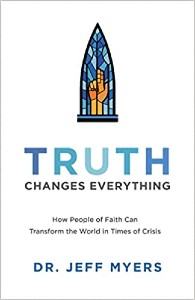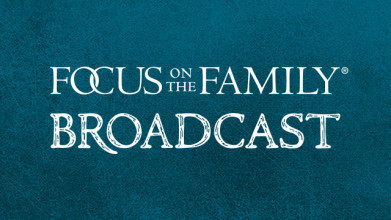Dr. Jeff Myers: I decided to look on the internet for synonyms for “work.” Are you ready? These are the first seven synonyms for work: labor, toil, exertion, effort, slog, drudgery, and the sweat of one’s brow.
Audience: (Laughing)
John Fuller: Well I wonder if those definitions of work sound about right to you? I mean, would you like to find more joy in your work? If so, stay tuned. Uh, your host is Focus-
Jim: (laughs)
John: … on the Family president and author Jim Daly, and I’m John Fuller.
Jim Daly: Well, today’s guest, Dr. Jeff Myers, uh, gave that fascinating message at a recent gathering of our staff, and I’m excited to share it with you. Uh, Jeff is the president of Summit Ministries, just down the road from us here in Colorado Springs. And he really has a lot to say. Um, so we’re gonna get right to the content.
John: And here now, Dr. Jeff Myers, on Focus on the Family. We’re starting just after his opening remarks.
Dr. Myers: Now a biblical worldview’s sometimes hard to come by when it comes to things like understanding the nature of our work every day, but the bottom line is this: God is a working God. God worked in creation. He is working still. And we are made in His image, the, in the image of a working God. It’s not just what we produce, it’s what is produced in us that is a testimony to the rest of the world, that there is meaning behind this whole thing.
Now my first job outside of our family business was working at a grocery store. I did not like the grocery business (laughs). I did not like my specific job, which was to take things that people purchased and put them in bags, you know, don’t put the eggs on the bottom kind of thing, and then to carry those bags out to their cars. Whether it, this was in Kansas, so whether it was 105 degrees or whether it was five degrees, it’s always one or the other in Kansas, my job was to properly put their groceries in a bag and take them out to their car. And I thought, this isn’t very fun compared to my friends who work at the country club or my friends who work in cushy office jobs.
And so I mentioned this to my father once. That did not go well.
Audience: (Laughing)
Dr. Myers: He said to me, “Son, you have a choice every single day: to bring excellence to your work, to make your customers happy, to make your coworkers glad that they work with you.” I to this day don’t know if that really made much of a difference in our store, but it sure made a difference inside of me.
Surveys done by the Gallup World Poll showed this seems to be a common theme running throughout the world. They’ve studied people in 160 different countries and found that 80% of the world’s workers are not experiencing engagement in their work. And by engagement, they mean involvement, enthusiasm, commitment. I’ll need you to just pause and think about that for a moment. Four out of five people in the world spend most of their waking hours doing something they see as meaningless. It’s no wonder the people struggle so much to find a sense of purpose in life. It’s no wonder that so many people have such a hard time seeing a good God at work.
So I’d like to shift focus just a little bit. Whenever I hear a statistic like 80% of people aren’t engaged, my mind immediately goes to, what about the 20%? What’s different about them? Is it just that they happen to have the plum jobs or that they just happen to be ones who get a high salary for the work that they do? And I realized based on my experience as a kid working in that grocery store that there might be something else to it, that there are some people in the world who find themselves able to make their work meaningful by the way they think about it and approach it.
And I think that’s what a biblical worldview does. So, there are three points that I want to share. The first one is to orient our work around Sabbath. Orient our work around Sabbath. The first three words of the Bible are a clue to understanding everything else between the covers. It is, Berah-sheet Ba-rah Elohim. That’s how you say it in Hebrew. Rabbi Jeff Goldwasser said we might translate that phrase, Berah-sheet Ba-rah Elohim “in the beginning.” We might translate it this way. “In the beginning of the beginning, that is always beginning. God created the creation that is still.”
Stillness is that Hebrew idea of the Shabbat. Our Sabbath is not just a break from our toil, it is a preparation for flourishing in every other area. That’s why God oriented the creation around Sabbath. So the seven-day week bears witness to this idea. I want you to think about this, this for a moment. A year is when the Earth takes one complete trip around the sun. A day is when the Earth makes one complete revolution. But a week? That is not a cycle that exists in nature.
Abraham Joshua Heschel in writing on the Sabbath said, “The idea of the seven-day week exists in the mind of God.” It is something that He gave to us as an expression of His nature, but also as a provision for us. And how do I know this? Because various revolutionary movements in history tried to change it. During the French Revolution, the revolutionaries was con- were concerned that if you have a seven-day week, then one day every week, people’s thoughts are going to turn toward God. We do not want their thoughts turning toward God, so we will literally change the calendar. And they did. They changed it to a 10-day week. People fell apart in their ability to get work done. People got sick. The animals died in the fields. There was something about that seven-day cycle that made the difference.
My Jewish friend David Nekrutman puts it this way: “God’s last act of creation was His first intention, that all of the work that we do is oriented around this calm sense of confidence that God is in charge and that He will bring meaning to the things that we do every day.” And you see this continuing on in Genesis chapter two. Genesis chapter two, Scripture says, “And God put the man in the garden to work it and to keep it.” This bothered me when I first really thought about this passage, because what it means is that work is not a product of the fall, it is part of God’s intentional act of creation. It took place before the fall.
Now there are aspects of our work that we would say, “That is fallen.” Okay? That is. That part of it is just plain toil. There is no way around it. But in a, in a way, God is saying to us, I know that, that you’re going to be doing some work. You’re going to be exerting yourself. There’s going to be resistance that you will experience, but when your, when your goal is growing, resistance is good, not bad. Isn’t it? I mean, no one goes to the gym and says, “You know what? I really wanna get in shape. So give me the lightest weights possible. Give me the easiest workout routine that you have.” You might say that at the gym, but not if you really have an ambition to get in shape, because you know that the resistance is going to be good.
Now, the Hebrew word for work is “abad.” And it not only means work, weirdly enough, it also means worship. Work is worship. And worship is work. We see this from the very first few chapters of Scripture. So the key question that I’m asking a lot with my team and even my own work is, what am I worshiping at work? Because I might be worshiping my task. There’s some things I love to do and some things I don’t love to do, but how am I worshiping God at work?
At Summit Ministries, eh, we are located in a little hippie town called Manitou Springs, and this little town is made up of lots and lots of old buildings. Buildings are cranky. Old buildings are really cranky. And it was really frustrating for a lot of people on our team when I came to be president of Summit Ministries. These old buildings, I mean they didn’t build it right, they did this wrong and it was easy to have kind of a grumpy attitude about it because you try to fix something and, in order to fix something, you have to fix something to fix something to fix something to fix something.
So we decided that we would ask ourselves what a biblical worldview of maintenance would be. And here’s one thing we decided: the people who built these buildings were doing the best that they knew how, given what they knew and the tools that they had to work with, and we have a stewardship privilege to now take these same buildings and do the best that we know how with the tools that we have to work with to prepare them to be useful for another 50 years. I’m telling you, if you talk to the people on our team, they will say that was the big change moment for them, because now everything is in exploration. How am I going to be a good steward? How am I going to appreciate what this person did that happened so long ago? And how can we be good stewards?
John: You’re listening to Focus on the Family, and that’s Dr. Jeff Myers. If you’re enjoying how he brings a biblical worldview to pretty much any subject, let me recommend his book, Truth Changes Everything. We’d be happy to send a copy of that to you when you make a donation of any amount to the ministry of Focus on the Family, and we’ll include a free audio download of his presentation with additional content. You can reach out online at focusonthefamily.com/broadcast or call 1-800, the letter A, and the word FAMILY. Let’s return now to more from Dr. Jeff Myers.
Dr. Myers: So that’s the first of three points. The second one is this: cultivate your strengths. Cultivate your strengths. A lot of times, I think Christians feel embarrassed to talk about their strengths. If you’re really good at something, then you’re not supposed to talk about it or ask to be able to work on that because you’ve got to be humble, and being humble means that you only understand how weak you are and how worthless you are and how nothing you do really matters. “But please, can I work on this anyway?” Kind of, you know, that’s, that’s sort of the attitude that we, seems like we’re sometimes supposed to have.
Go back to Scripture though again. Deuteronomy chapter six, verses four to five. There’s a very famous passage that has a very good conclusion, and you probably have heard this before: “Hear, O Israel, the Lord our God, the Lord is one. You shall love the Lord your God with all your heart, and with all your soul, and with all your might.” Now that word “might” confuses people, because it’s actually the Hebrew word “me’od,” which means “very.” It is a modifier. Now go, go back and listen to that passage again: Love the Lord your God with all your heart, and with all your soul, and with all your very. No wonder people think that the Hebrew, people are so difficult to understand. What on earth does it mean to love God with your very? Well, it means loving God with your muchness, loving God with everything you have.
You know, it’s, it’s fascinating and it sounds odd to bring this into the, to the talk this morning, but brain researchers have had some really interesting breakthroughs in the last few years. They study people when they’re working on things that they find interesting, and they found that work that we find absorbing is associated through different neural networks with our sense of pleasure and sense of control. Have you ever had that experience before when you were working on something you found so absorbing that you literally lost track of time and space? Maybe as a student you had a chance to write a paper on a topic that you really loved, and you got so absorbed in it that all the sudden you look at the clock, oh, it’s two o’clock in the morning, you didn’t even know because time passed.
I think about these as what we call motivated abilities, and I think they give us clues to the specific design that God has given to each of us. So I ask my students to think about the answer to this key question: “What returns energy to you and makes you feel more alive?” So I went back and started thinking, what are those experiences in my life where I did something that returned energy to me, it made me feel more alive, and what do those experiences have in common? And that’s when I realized, I was a teacher not just when I became a professor. I was a teacher from the time I was a little kid.
I remembered, as I thought through that experiment, going to school and learning to read. To me, this was magical. It was like I’d been given a secret decoder ring. All the sudden, all of the content of all of these books opened itself up to me and I got so excited as a little kid that every day after school, I would go home and say to my little brother Scott, “Sit down here in the hallway and we’re gonna talk about the ‘fuh’ sound or ‘stuh,’” or whatever. I said, “You realize that if you know these sounds, you can decode all of the words in all of the books in the world?” I was so excited about this, and he got excited about it. He got so excited, in fact, that he learned to read right about the time he turned four.
Nobody in my school believed that my four-year-old brother could read. So I brought him to Show and Tell one day.
Audience: (Laughing)
Dr. Myers: “This is my little brother. He can read.” And people would pull books off the shelf and he would read them. “No way!” They couldn’t believe it. It wasn’t so much that I wanted to teach my little brother to read, it’s that I could not not teach him to read. Obviously I don’t teach grammar. But you understand the point. And I could s- some of you are nodding because you’re like, “Yes, I’ve, I’ve had that kind of experience before.”
Usually that kind of experience involves great effort. When my students would write down the list of things that returned energy to them and made them feel more alive, almost nothing on the list involved idleness. It was some kind of an activity, something that i- maybe even was very difficult for them, but they just couldn’t wait to do more because they were made for it. It’s as, as if they were specifically designed by someone who experienced joy in work and wanted them to find joy in work as well. Thomas à Kempis was Christian mystic, and he said, “Idleness makes it boring to be alive.” An entire society overcome with boredom, and we can’t quite understand why. Well, the first point was orient around the Sabbath. The second one was cultivate your strengths.
The third one is seek synergy with others. In Scripture, we’re given a model for this. The Apostle Paul in 1st Corinthians chapter 12 describes Christian community as a body. It is the body of Christ. Now think about how a body works and how all the different parts are necessary to fit together. And when they don’t fit together, something really bad has happened. I mean imagine if you walked into the building this morning and there was an arm laying on the sidewalk. I know that’s morbid, but just follow me through the example. There’s an arm laying on the sidewalk. Your first thought would be: yesterday’s workday did not end well.
Audience: (Laughing)
Dr. Myers: Things are coming apart, quite literally. I’m not even sure I want to go in that building, because we know that the body without the arm loses a significant part of its function, and the arm without the body is unable to actually be what an arm is designed to be.
But take that idea of the body of Christ and apply it to the work that you do every day. People who work in a Christian environment or in a secular environment can do this. The question is, whose strengths complement my strengths? I found early on when I started a business that I was very bad at handling lots of fast-moving complex tasks. So my response to that was (laughs) actually just to clear my desk. I’m a big thrower-awayer. You can tell when I’m under stress because I just start walking around the house throwing stuff away. My kids knew like, “Where’s my library card? Papa probably put it in the trash.” And so that I just, I just…
Uh, so, this is not good. Like when you’re a college professor, this is especially bad. “Did you grade my paper?” “Oh, I threw it away. It’s too much stress. Can’t do that.” So I, I needed someone to help me, and I hired an assistant. And it worked really well for a period of time, and then she and her family moved away to a different city, and all the sudden I found that I really needed some help. So, I’ve walked out of my office one day, down the hall was walking a young woman who had been in one of my classes. And I asked her, “Hey, what are you doing on campus?” She said, “I don’t know. I’m, I’m on campus looking for a job.” Well, I asked her into my office, “Can I interview you right now?” She sat down across from me, the whole time I’m thinking, Lord, just give me one intelligent question to ask.
Audience: (Laughing)
Dr. Myers: I’m a horrible interviewer.
Audience: (Laughing)
Dr. Myers: And the question was, what does a good day of work look like for you? And she said, “Oh, a good day of work is when I come in in the morning and everything is in complete chaos, total disarray, and by the time I leave, I brought order and structure to it.”
Audience: (Laughing)
Dr. Myers: And I’m telling myself, just relax. You have to ask at least two questions before you hire someone.
Audience: (Laughing)
Dr. Myers: And so (laughs) I asked her, “Well, can you give me an example of that?” She said, “Sure. I love balancing my checkbook.” She said, “It’s like a game making all the numbers come out right.” I’m sitting there thinking, you have a checkbook? I threw my mine away!
Audience: (Laughing)
Dr. Myers: And it turned into a wonderful, productive working relationship for many years, because God had given me a vision, but in His mercy withheld from me the administrative ability to carry out that vision, so that I would be compelled to seek out people who are really good at the work of administration and wanted to use those skills in the service of a vision.
Well, this is a, just something that happens individually. The body of Christ is all of us together. It’s not just about what we individually can produce, it’s what together as a community we can produce, with all of the different parts. This happens moment by moment. There are two Greek words for time that you see in the New Testament of Scripture. One is chronos, which refers to clock, time. The other one is kairos, which refers to opportunity time. When Paul says, “Make the most of every opportunity,” that’s a kairos moment.
So, we have two different things going on. We have the minutes, and we have the moments. Our goal is to take the minutes and turn them into moments, where the work really matters. Well, how do you do that? How do you do that in everyday work? Well, the, yesterday I shared with my team this: “First of all, I want you to think about the interactions you have everybody on your team every day as if it would be the last thing you would ever get to say to that person. I want you to have that level of interaction, that sense of the importance of what our communication means. But second of all,” I said, and this is the tension, “I want you to invest in others as if you knew you would be working with them for the rest of your life.” That tension of the minute and the moment is when community really comes to life.
So, why is the biblical worldview of work so important? Well, organizations come and go. People are forever. Business partner, friend, a friend of mine liked to ask the companies that he was working with, “What if God didn’t give you these people to make your company successful, but He gave you this company to make those people successful?” And I realized, there’s something incredibly powerful in that, because every single day, every person we touch, we have the opportunity to show them that we live in a meaningful world because Jesus has risen from the dead.
You know what really I think is the cross of Jesus that is our symbol, that the world is chockfull of meaning. At Summit Ministries, we have a cross on top of our antique hotel where our summer programs are held. And it lights up, bright white at night. You can see it from anywhere in town, you can see it from the highway driving by. And it’s become even in a little hippie town kind of a, sort of cool, you know? People like it. I found this out just a couple of months before I came to be the president of Summit Ministries when I was in the process of putting together a team. One of our employees said, “You know, we had a windstorm and the cross got docked over, and a guy came knocking on the door very frantic. He said, ‘Your cross fell over. You need to get it back up there.’”
And our employee said, “Yes, we will get it back up there. Thank you for letting us know.” But and, this she’d, she’d asked him, “But I’m really curious about why this is so important to you because I know that you’re a Buddhist. And he said, ‘Dude, the whole vibe of our town is off if your cross is not on.’”
Audience: (Laughing)
Dr. Myers: And I thought, he said way more than he could actually know, because it is in the cross that we recognize, the penalty has been paid, that Jesus has risen from the dead, and that everything we do is meaningful in that respect. So we rest, knowing that our efforts, when we’re working the way God has designed us to work and working in cooperation with other people are fulfilling His great purposes for the world, even if in that moment we don’t see it.
John: What great perspectives on Focus on the Family from Dr. Jeff Myers. He’s president of Summit Ministries in Manitou Springs, Colorado.
Jim: It was really interesting, John, a- and it encourages me to know that when you apply a biblical worldview to a subject, it makes much more sense. And if you enjoyed today’s presentation, you’re gonna want to get a copy of Jeff’s wonderful book called Truth Changes Everything. It’s (laughs) a great statement. It’s filled with stories about how Christians have influenced culture in times of crisis in areas like science, art, medicine, education and justice. The book will inspire you to live for truth in your own area of expertise.
John: And it’s, uh, such a fascinating read, so get a copy from us here today at Focus on the Family, and when you do, we’ll send a free audio download of Jeff’s entire message, including some extra content that we just couldn’t squeeze into the airwaves here. Uh, just call us at 800-A-FAMILY, that’s 800-232-6459, or make a donation of any amount today and request your copy of that book and the audio download at focusonthefamily.com/broadcast.
Jim: I was also struck by, uh, what Jeff said about loving God with your muchness. That was from the Old Testament Deuteronomy chapter six, verses four and five, where it says, “You shall love the Lord your God with all your heart, and with all your soul, and with all your might.” Jeff said that the word “might” translates to the word “very,” as in loving God with everything we have. That’s quite a challenge, but when you really think about it, it’s the best way to live, and it will bring the eternal into every aspect of your life. Wow, I love that idea. Uh, and if you want to talk to someone about how to live out today’s message, please give us a call. Our friendly staff would love to hear from you and hear your perspective and pray with you.
John: Yeah, they’re a great team and they’re a phone call away. And our number is 800-A-FAMILY. That’s 800-232-6459. Next time, relationship coaches Sean and Lanette Reed explore ways to manage transitions in your marriage and they offer hope to couples who may be feeling a bit splintered.
Sean Reed: What would it look like for Jesus to walk into the room? Is there room for God? He is the difference-maker. And, and at our darkest moment, He told us His grace was sufficient, and He meant it. And that’s what brought us through.



















